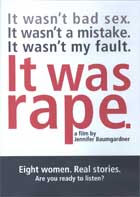
It Was Rape 2013
Distributed by Jennifer Baumgardner
Produced by Jennifer Baumgardner
Directed by Jennifer Baumgardner
DVD , color, 60 min.
Sr. High - General Adult
Adolescence, Criminal Justice, Human Rights, Gender Studies, Women’s Studies
Date Entered: 06/11/2013
Reviewed by Patricia B. McGee, Media LibrarianIt Was Rape is an extraordinarily powerful, disturbing anthology of eight women’s experience of sexual assault. The women are from diverse racial and ethnic backgrounds: Native American, middle class Middle American, a farm girl from North Dakota, a Jamaican of mixed race, a first generation daughter of a Kenyan father and a Bahamian mother. The rapists were a father, school classmate, neighbor, boyfriend, and casual acquaintances; all of the women knew their assailants. Regardless of the circumstances of the assaults, what the women have in common are how they felt afterwards. They felt ashamed and that somehow they were at fault; they should have done something differently.
These first person narratives are seamlessly interspersed with vintage and family photos and home movies; the narration is articulate yet unobtrusive. At times this is a difficult film to view; while some of the assaults took place as long ago as the late 1970s, the emotions are still raw even after so many years. Director Jennifer Baumgardner calls rape “the feminist issue that never changes,” and describes her film as being “about learning to listen.” Those who listen carefully will find that rape is more than a feminist issue, it is a family issue as well— rape strikes at the very heart of the family. In no way is it appropriate to think of these women as victims or even as simply survivors. These women are triumphant in their careers and in their personal lives as mothers, critics, writers, a chef, a blogger, and performance artists.
It Was Rape is a thoughtful yet provocative film that will surely serve as a springboard for passionate discussion about a problem that simply won’t go away. It is a must have for all women and gender studies programs and strongly recommended for all collections.